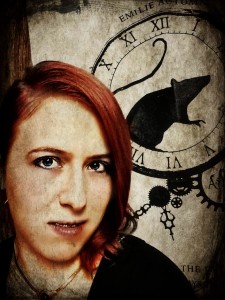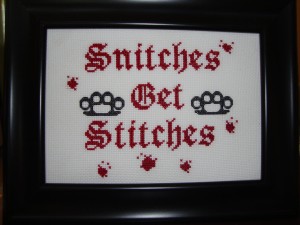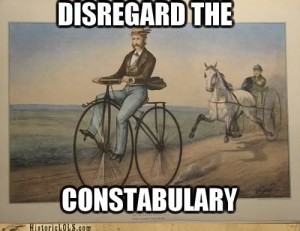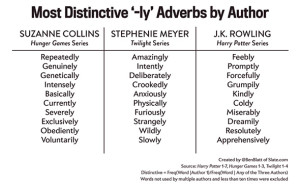A guest post by Emily Godhand.
Oh sure, give Friday the 13th to the horror writer. I see how it is. Two can play this game.
I apologize for nothing.
It seems a bit blasphemous (Hi! I’m Godhand) to call out one of the first rules I ever heard when writing stories: Show, don’t tell.
This quickly became the only rule I ever heard, as it seemed the easiest way for anyone who had ever put pen to paper to become a critic and ‘help’ me with my story. (Even you, Ms. High School English Teacher! For shame.)
But the problem was, as well-intentioned as everyone was, there was never enough ‘showing’ and any sort of ‘telling’ was immediately reprimanded with that ‘rule’. They were taking it as an axiom, and weren’t looking at context, style, pacing or point of view. They weren’t listening to it as a story, as an oral narration passed from person to person.
Oh, no.
It was just “you’re directly telling me something and there’s a RULE against that and therefore that’s bad.”
Sure, they wanted to be helpful, but they didn’t have or didn’t know how to deliver constructive feedback, so by God, they were going to keep repeating that suggestion no matter how minutely I described every mundane detail of every person my protagonist encountered. It wasn’t enough to just say he was “fair, fit, and flawless”; they wanted every last detail of this man’s physical description until I had spent a page non-ironically devoted to the magnificence of his beard.
When really, there are no words.
I mean, it was a well-intentioned enough rule meant to draw out vivid descriptions and immersive, flavorful text that evoked cinematic images from the effective use of word-play. It was meant to avoid mundane descriptions and narrations. But…in the process, describing every last little thing in an attempt to ‘show and not tell’ creates mundane descriptions and narrations.
“Bob was happy. He drank his coffee. Then he went to work.”
Some have taken it so far as to be interpreted as “Don’t tell ANYTHING”, as if the story is some sort of well-kept secret only to be ascertained by the finest of reader-sleuths.
…After they dredge through a purple sea of descriptions, that is.
“The Writer’s Motto!” …wait…
The other extreme being, of course, is to show EVERYTHING. Which isn’t much better.
Let’s go back to Bob.
“Bob picked up his yellow mug with a bright smile. He took a sip then set it down. His lips puckered at the taste and twisted his face into a scowl. He took another sip. The metallic toaster popped up golden brown toast. His stomach growled. He left the toast in the toaster and took another sip….”
Do I care that the mug is yellow? Is there something special about the toaster that I need to describe it as ‘metallic’? Is toast anything but golden brown? Does all that description even matter? Bob’s having breakfast. Tell me he’s having breakfast and then Cut. End scene.
You could tell me he got ready for work “with his usual breakfast of black coffee laced with self-loathing”, but to tell me anything more implies there is something important within the context of the breakfast itself. If there isn’t, you’re just slowing down the pacing. Giving attention to something tells the reader ‘this is important!’
But you can mix showing with telling. You can do that. You’re the writer. You’re a God with a pen in your hand; there are no rules, only suggestions.
“Bob was happy.
At least, that’s what he told himself as he poured a large mug of black coffee. He had a good home, a good wife, a good job. He plastered on a smile and chugged down the burning liquid, still ignoring the toast that popped up behind him minutes ago.
What good was his home to him when he was never there?
What good was having a wife when she hated him?
What good was having a job if he couldn’t bring himself to go in?
He hung his head in utter shame.
No, Bob was miserable, and he knew it.”
Ask yourself:
Is this adding to the texture and flavor of the story?
Is it appropriate for the current pacing? (description slows things down)
Is this most effective way of delivering important (or at the very least, interesting) information in your style?
If not, get on with it already! There’s an antagonist to face and obstacles to overcome and you’re here writing something that could be summarized as “Bob had his normal breakfast of black coffee and self-hatred before heading into work.”
But that would be story-telling.
So what is a writer to do?
*Keep point of view in mind-
Who is telling this story and who are they telling it to?
Would you say it this way when telling the story to someone else?
*Keep pacing in mind-
What information do they need to know right now, and is it worth slowing the story down to show this information?
*Keep in mind this is a narrative medium, not a visual one-
You can hand over information freely in a narrative medium. You are conveying information; give the information the reader needs to, or should, know, in order to enjoy the experience.
Then again, there’s a lot to be said about straight up telling information to your readers without ever showing them anything.
As it is Friday 13th, there’s always the classic horror tactic of telling the reader just how indescribable something was, because, My God, it works.
Look at this lucky bastard with no eyes.
“My dearest reader,
I cannot even begin to describe the horror, the insanity, that this beast invoked within the depths of my jaded soul.
I cannot — WILL NOT — describe this evil nightmare, as you and this .45 are my only friends left, and I fear if I even began to describe a fraction of the terror I’ve witnessed, your eyes would burst within their sockets and your mind would shatter into a thousand pieces.
They would lock you away in a quiet room at the furthest reach of Arkham’s towers because you’d do nothing but scream,
and scream,
and scream.
The image of this grotesque monstrosity would be forever seared into your mind. Never again in your short, miserable life, (if God is merciful), would you ever know any rest or peace again.”
-Lovecraft possessing Godhand
And it’s like, well, Mr. Narrator- writing-in-second-person, you’ve done a lot of telling for sure, but, you’ve also shown me what this thing looks like as well, and …you know what, Man? Maybe…maybe I don’t wanna see it.
That’s how it’s done. Ladies? Call me.
My friend and mentor Bruce Elgin gave me only two rules for writing:
1) Be Clear
2) Don’t be boring
If you can do both these things, your writing works. You can do what you want.
So go on and tell me a story.
About Emily Godhand:
Emily Godhand is a cross-genre author who lives in a book fort in Denver, CO, with nine rats who revere her as their Queen.
As former psychiatric technician, she draws her inspirations from her work and the constant nightmares she’s had for 13 years. As such, her works tend to focus on an exploration of trauma, immortality, and human consciousness.
Read her latest work on Wattpad, where she is an Ambassador.











